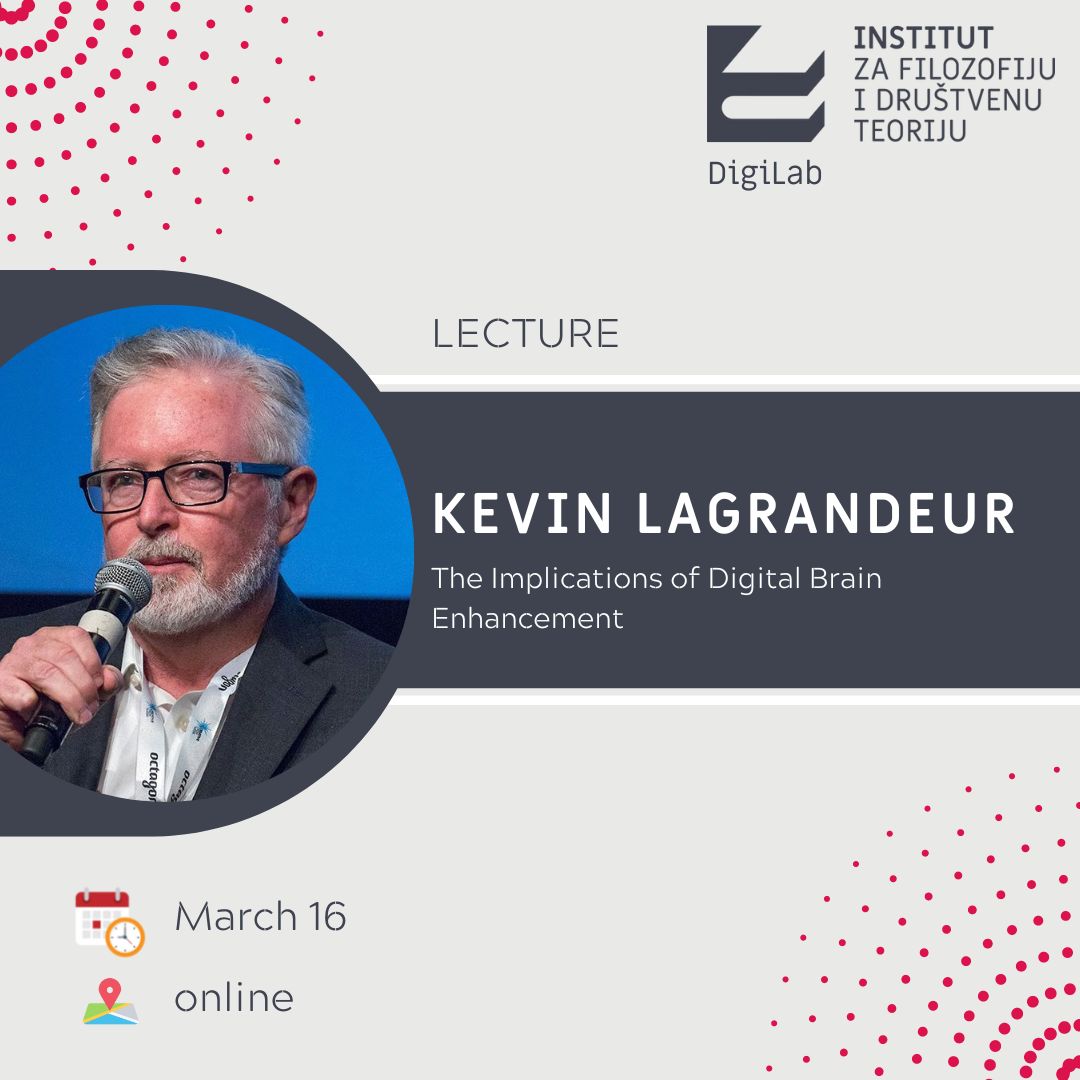
[Lecture] Kevin LaGrandeur, The Implications of Digital Brain Enhancement (DigiLab)
🗓 March 16 🕒 17:00 CET 🔹 online
THE FUTURE OF AI: SOCIAL AND CULTURAL ASPECTS
Online lecture series
Kevin LaGrandeur (New York Institute of Technology)
The Implications of Digital Brain Enhancement
Neuralink, a company founded by Elon Musk three years ago, is the most notable of several companies developing a new type of Brain-Computer Interface (BCI): a direct, two-way, digital system that is robust, compact, and wireless. A big reason Musk’s company has received so much attention is because he has stated that its long-term aim goes beyond current therapeutic uses to the merging of humans with AI. A related cognitive enhancement has been developed by a team at the University of Southern California led by Theodore Berger: a prosthetic digital memory that can be implanted in the brain. It holds the possibility not only to replenish lost memories for those who have memory problems, such as Alzheimer’s patients, but also to artificially enhance the memories of healthy people. These advances present great promise, but also dangers. BCI is already being used for emotional and mood therapy in psychiatric patients, and some posthuman ethicists want to use it, among other technologies, for moral enhancement of the human species. It could also radically increase a user’s thinking speed and abilities to interact with digital machinery, allowing humans to compete with AI for jobs (a key hope of Musk’s); however, it also presents ethical problems related to who gets it, to safety, and to privacy. Similarly troubling, prosthetic memory has already been used by Berger to give rats and primates false memories of experiences they never had. Some of these uses of intelligent technology have been anticipated by fiction—especially science fiction. My talk will address the promises and pitfalls of these emerging technologies as represented in fiction and in the real world, and possible solutions for the dangers.
Dr. Kevin LaGrandeur is Professor Emeritus at the New York Institute of Technology (NYIT), Fellow of the Institute for Ethics and Emerging Technology, co-founder of the NY Posthuman Research Group, consulting expert for the Global Institute for AI Ethics, and Advisory Board Member of the Lifeboat Foundation (which seeks ways to promote safe development of new technology). He specializes in technology and culture, ethics, and education. Dr. LaGrandeur is a member of the founding editorial boards of two journals: AI and Ethics, and the Journal of Posthumanism. As well, he is on the founding editorial board of the book series Critical Posthuman and Citizenship Studies, by the publisher Rowman and Littlefield. He has published more than 50 articles and media productions, in both professional venues and the popular press, and 2 books: Artificial Slaves (2013), which won a 2014 Science Fiction and Technoculture Studies Prize, and Surviving the Machine Age (2017), with sociologist James Hughes. Among his current projects, he and his colleague John Misak are developing an Augmented Reality game to help students understand Shakespeare and his world.
This lecture is a part of The Future of AI: Social and Cultural Aspects online lecture series that brings international experts to discuss the philosophy of AI, AI and post-digital aesthetics, cultural impacts of AI, AI (in) art, non-human agency, AI-driven social transformations, and, more generally, our coexistence with AI and digital technologies in all aspects of daily life. The series is organized by the Digital Society Lab [DigLab] of the Institute for Philosophy and Social Theory.
